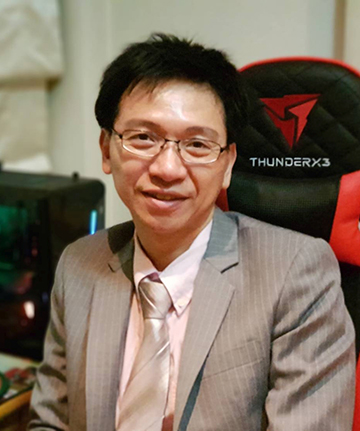
Sanguan Anantathanasarn
For this installment of Senior Member Insights, we talk with Sanguan Anantathanasarn. Sanguan is a founder and leader of the research and development (R&D) group at Furukawa FITEL (Thailand) Co., Ltd., the first Asian R&D lab of Furukawa Electric Group outside of Japan. Prior to returning to his home country of Thailand, he worked as a researcher focusing on photonic and electronic devices based on III-V semiconductors at the Research Institute on Communication Technology: Basic Research and Applications (COBRA), Eindhoven University of Technology, Netherlands, and at the Research Center for Integrated Quantum Electronics (RCIQE), Hokkaido University, Japan. His current research interests cover light source devices for telecom and industrial applications, including fiber Bragg gratings, as well as machine-learning disciplines in artificial intelligence.
What first interested you in pursuing science?
Natural phenomena intrigued me. As I learned engineering, I became impressed by the human ability to understand and adapt such phenomena into the technologies of daily life. Nevertheless, it was the lack of expertise in our region that pushed me into higher-degree study in science.
What aspect of your current work do you find the most interesting or exciting?
My three roles of being the “one in between” are unique and exciting. I currently stand between industry and academia, between research and applications and between laser crystal growth and fiber-coupled laser device operations.
What is one piece of advice that you wish you were given as a student/early in your career?
In parallel with theoretical study, it is equally important to keep practicing both experiments and coding, either for simulation or automation purposes.
What professional resources do you rely on to stay active and engaged with your field?
Although conference participation requires budget availability nowadays, you always need conferences to stay active in the field.
What tips for successful networking do you have for early-career professionals?
Make sure you contribute during networking. Show an interest in the opinions of others and ask questions.
What advice do you have for young scientists who are about to interview for their first job?
Understand the job description of the interview beforehand. The interview is not only about testing you, but also an opportunity for you to test the job and organization. The goal is to make sure the job suits your interests.
What are daily habits that help you to be successful?
Conversation, rather than checking email, is the first thing I do in the morning because face-to-face communication is a powerful tool. Some other tips are to: walk fast because it keeps you active, read journals and magazines regularly to keep you updated, and ask at least one question in any meeting or presentation to deepen and broaden your understanding of the topic.
How important are leadership roles in career development and how do you hone your leadership skills?
Leadership skills are very important because 70% of team success originates with the leader.
I have shaped my own leadership skills by trying to understand the differences and characteristics of people. Advice works for some people while teaching works for others. Specific interests can create differences from people around you, which is what happened in my early stages. I was lucky to have mentors who understood such differences.
At this point in your career, what are you most looking forward to next?
I am looking forward to seeing the young generations that I have mentored expanding the groups we have built. I am also looking forward to seeing them build their own labs.
If you weren’t in the sciences, what would be your dream career?
My dream career used to be an astronaut—which is also science-related, isn’t it?
